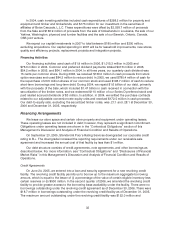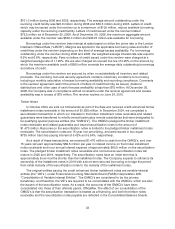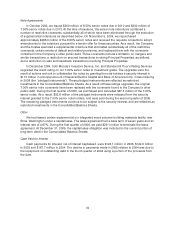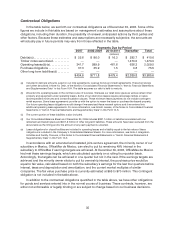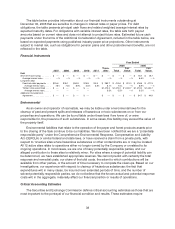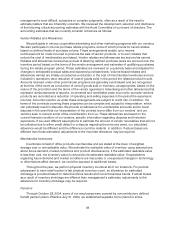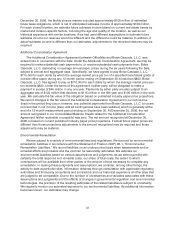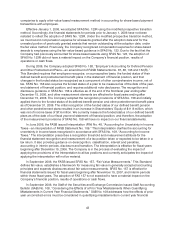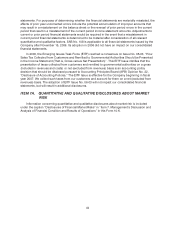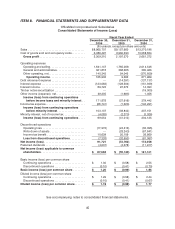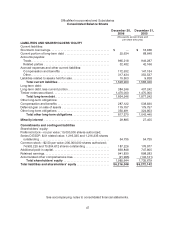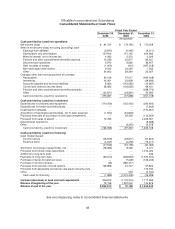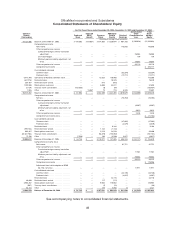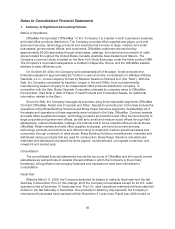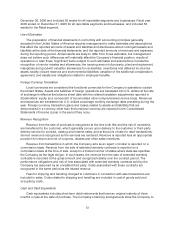OfficeMax 2006 Annual Report Download - page 46
Download and view the complete annual report
Please find page 46 of the 2006 OfficeMax annual report below. You can navigate through the pages in the report by either clicking on the pages listed below, or by using the keyword search tool below to find specific information within the annual report.42
Environmental liabilities that relate to theoperation of the paper and forest products assets prior
to the closing ofthe Sale continue to be liabilities of OfficeMax, in addition to the liabilities related to
the 12 active sites referenced in Note 19, Legal Proceedings and Contingencies, of the Notes to
Consolidated Financial Statements in“Item 8.FinancialStatements andSupplementary Data” in this
Form 10-K.
Goodwill Impairment
SFAS No. 142, “Goodwill and Other Intangible Assets,” requires us to assess goodwill for
impairment at least annually inthe absence ofan indicator ofpossible impairment and immediately
uponan indicator of possible impairment. In assessing impairment, the statement requiresus to make
estimates of the fair values of ourreporting units. If we determine the fair values areless than the
carrying amount of goodwill recorded on our Consolidated Balance Sheets, we must recognize an
impairment in our financial statements. At December 30, 2006, we had $1.2 billion of goodwill
recorded on ourConsolidated Balance Sheet. Of the $1.2 billion, $528.1 million and $687.9 million
were recorded in ourOfficeMax, Contract and OfficeMax, Retail segments, respectively. At
December 31, 2005, we had $1.2 billion of goodwill recorded onour Consolidated Balance Sheet. Of
the $1.2 billion, $523.5 million and$694.7million were recorded in our OfficeMax, Contract and
OfficeMax, Retail segments, respectively.
We completed our annual assessment inaccordance with the provisions of SFAS No. 142 in the
first quartersof 2006 and 2005, and concluded there was no impairment. We completedanadditional
assessment of the carrying value of thegoodwill in the OfficeMax, Retail segment inthe fourth quarter
of 2005, in connection with the development ofmanagement’s planto close retailstoresin 2006, and
concluded there was no impairment.
In testing for potential impairment, we measured the estimated fair value of our reportingunits
based upon discounted future operating cash flows using a discount rate reflecting our estimated
average cost of funds. In estimating future cash flows, we used our internal budgets and operating
plans, which include assumptions about retail store openings and closures, theconsolidation of our
distributionnetworks and improvements in our supply chain. Differences in assumptions used in
projecting future operating cash flows andin selecting an appropriatediscount rate could have a
significant impact on the determination of fair value and impairment amounts.Due to thenumerous
variables associated with our judgments andassumptions relating to the valuation ofthe reporting
unitsand the effects of changes incircumstances on thesevaluations, both the precision and
reliability of the resulting estimates are subject to uncertainty. As additional information becomes
known, we may change our estimates.
Recently Issued or Newly Adopted AccountingStandards
Following are summaries of recentlyissued accounting pronouncements that have either been
recently adopted or that may become applicable to the preparation of our consolidated financial
statements inthe future.
In December 2004, the Financial Accounting Standards Board issued SFAS No. 123R, “Share
Based Payment.”SFAS No. 123R is a revision of SFAS No. 123, “Accountingfor Stock-Based
Compensation,” and supersedes Accounting Principles Board Opinion (APB) No. 25, “Accounting for
Stock Issued to Employees,” and its related implementation guidance. SFAS No. 123Rfocuses
primarily on accountingfor transactions in which anentity obtains employee services in exchange for
share-based payments. SFAS No. 123R requires entities torecognize compensation expense from all
share-based paymenttransactionsin the financial statements.SFAS No. 123R establishes fair value
as the measurement objective in accounting for share-based payment transactions and requires all


